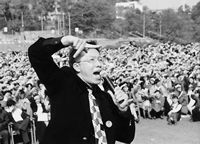
|
 |
Crazy
English
|
CHINA
/ 1999 / Mandarin, English / Color / 35mm (1: 1.37) / 90 min
Director, Photography, Producer: Zhang Yuan
Editing: Xu Hong
Music: Li Xiaolong
Sound: Shen Jianqin, An Wei, Hou Xiaohui
Producer: Zhang Yuan, Chen Ziqiu
Production Company: Keetman Ltd, DMVE Culture, Development
Co., Ltd
Source: Zhang Yuan
Room 607, New Bldg. 5, No. 43 St. Baojia
Xi Cheng Qu, 100031 Beijing, CHINA
Phone: 86-10-6494-6187 / Fax: 86-10-6497-1035
E-mail: shan@cenpok.net / yuanfilms@mail.263.net.cn
 |
|
Zhang
Yuan
Born in 1963 in Nanjing. Graduated Beijing Film Academy 1989. Although
assigned to a military film studio he produced independent films in
the post-Tiananmen years. His first feature, Mama (1990), about
an unwed mother and her mentally disabled son was officially banned
by the government although a print surreptitiously taken out of China
was screened at the 1991 Festival of Three Continents at Nantes and
was awarded a Judge's Special Award and the Audience Prize. After
making Beijing Bastards (1992), he and Duan Jinchuan co-directed
The Square (1994) which was screened at YIDFF '95. East
Palace, West Palace (1996) was screened in Un Certain Regard at
Cannes in 1997. His latest film 17 Years won the Special Prize
for Directing at the Venice Film Festival.  |
This newest work
from filmmaker Zhang Yuan, well-known for The Square (1994),
portrays the unique English-teaching method of Li Yang, a method known
throughout China as "Crazy English." Under the motto "Studying
English is the road to self-improvement, breeds patriotism, and builds
a strong country," Li has traveled the length of the country,
including 60 different cities and provinces, for ten years to popularize
his own "crazy" method of English education. The method
is highly performative, for as Li puts it, "Studying English
is a physical endeavor, not a spiritual or intellectual one."
Crazy English shows Li's energetic activities as he puts his
unique educational method into practice, following Li as he lectures
to students, citizens, the People's Liberation Army, at Beijing and
Tsinghua Universities, the Forbidden City, the Great Wall, trading
companies, hotels and in the countryside. Li and his fellow citizens'
fervor for English-language education conveys the energy of contemporary
Chinese economic development, but the movement is also not without
the quasi-religious flavor of the Falun Gong movement, made illegal
in China only this July. That highly regimented fervor, one seen also
in the Red Guards during the Cultural Revolution, provides fascinating
insight into contemporary China.
[Murayama Kyoichiro]
Director's
Statement
One of my friends told me the story of a man named Li Yang who was
touring China lecturing on "Crazy English." At the beginning
when I heard the story, it was so strange to me, learning English
by shouting, making all sorts of gestures like dancing, and even more,
thousands of people following him shouting English each time when
he is lecturing. I found some of Li Yang's slogans to be very interesting.
For example, "Make 300 million Chinese speak fluent English!"
"Make the voice of China be widely heard all over the world!"
"I love losing face." "Learning English is a piece
of cake." "To be a confident Chinese." I made the decision
to make a film on the English teacher within a week.
I found "Crazy English" is not only a method of learning
English. It is of much deeper meanings, just like Li shouts at the
beginning of the film: "Crazy English! Crazy life! Crazy work!
Crazy study! Crazy everything! Crazy everyday! I love this crazy game!"
Up until now, I still wonder if "Crazy English" is method
or madness. |
  |
|
before  next next |
COPYRIGHT:Yamagata International Documentary Film Festival Organizing Committee |